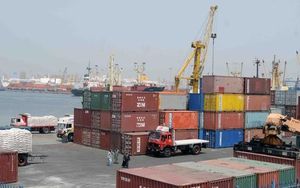Switzerland has taken a significant step in its foreign policy by aligning with the European Union (EU) to impose sanctions on eight Russian state media outlets. This announcement was made by the Swiss Economic Ministry on April 22, 2025, and the sanctions will come into effect on April 23, 2025. This decision marks a notable shift for Switzerland, a country traditionally known for its neutrality in global conflicts.
The sanctions are part of the EU's 16th sanctions package, which was introduced on the third anniversary of Russia's full-scale invasion of Ukraine. The package aims to exert pressure on Russia by targeting various sectors, including media outlets accused of spreading Kremlin propaganda, as well as imposing restrictions on Russian banks and aluminum imports.
According to the Swiss Economic Ministry, "Eight organizations have been added to Annex 25 and the existing entries concerning 158 individuals and organizations in Annex 8 have been updated." The eight Russian media outlets that are now facing sanctions include Eurasia Daily, Fondsk, Lenta, NewsFront, RuBaltic, SouthFront, Strategic Culture Foundation, and Krasnaya Zvezda. These outlets have been implicated in disseminating misleading information about the war in Ukraine, thus supporting the Kremlin's narrative.
In addition to targeting media, the new sanctions impose stricter regulations on Russian banks and aluminum sales. The EU has also focused on what is referred to as Russia's "shadow fleet"—oil tankers that operate covertly to transport Russian oil, circumventing international scrutiny. The goal of these measures is to cut off revenue streams that fund the Russian government amidst ongoing military operations.
Switzerland's decision to impose these sanctions reflects a growing willingness to participate in international efforts against Russian aggression, despite its longstanding policy of neutrality. While the Swiss government has refrained from providing military assistance to Ukraine, it has offered substantial economic and humanitarian support. To date, Switzerland has contributed billions of dollars in aid, including food, shelter, and medical supplies, to help those affected by the conflict.
Interestingly, Switzerland has also indicated a potential willingness to participate in a peacekeeping mission in Ukraine, but only if a ceasefire is established. This potential involvement underscores the country's evolving stance on global security matters, as it seeks to balance its historical neutrality with the pressing need to address humanitarian crises.
By aligning itself with EU sanctions, Switzerland is sending a clear message that the spread of false information during wartime is unacceptable. This move signifies a departure from its traditional diplomatic stance and highlights the importance of defending fundamental human values, even as a neutral party.
As the situation in Ukraine continues to evolve, Switzerland's actions may serve as a precedent for other nations grappling with the complexities of neutrality in the face of aggression. The Swiss government's recent decisions illustrate that even countries with a history of non-involvement can take decisive actions to uphold international norms and support those in need.




